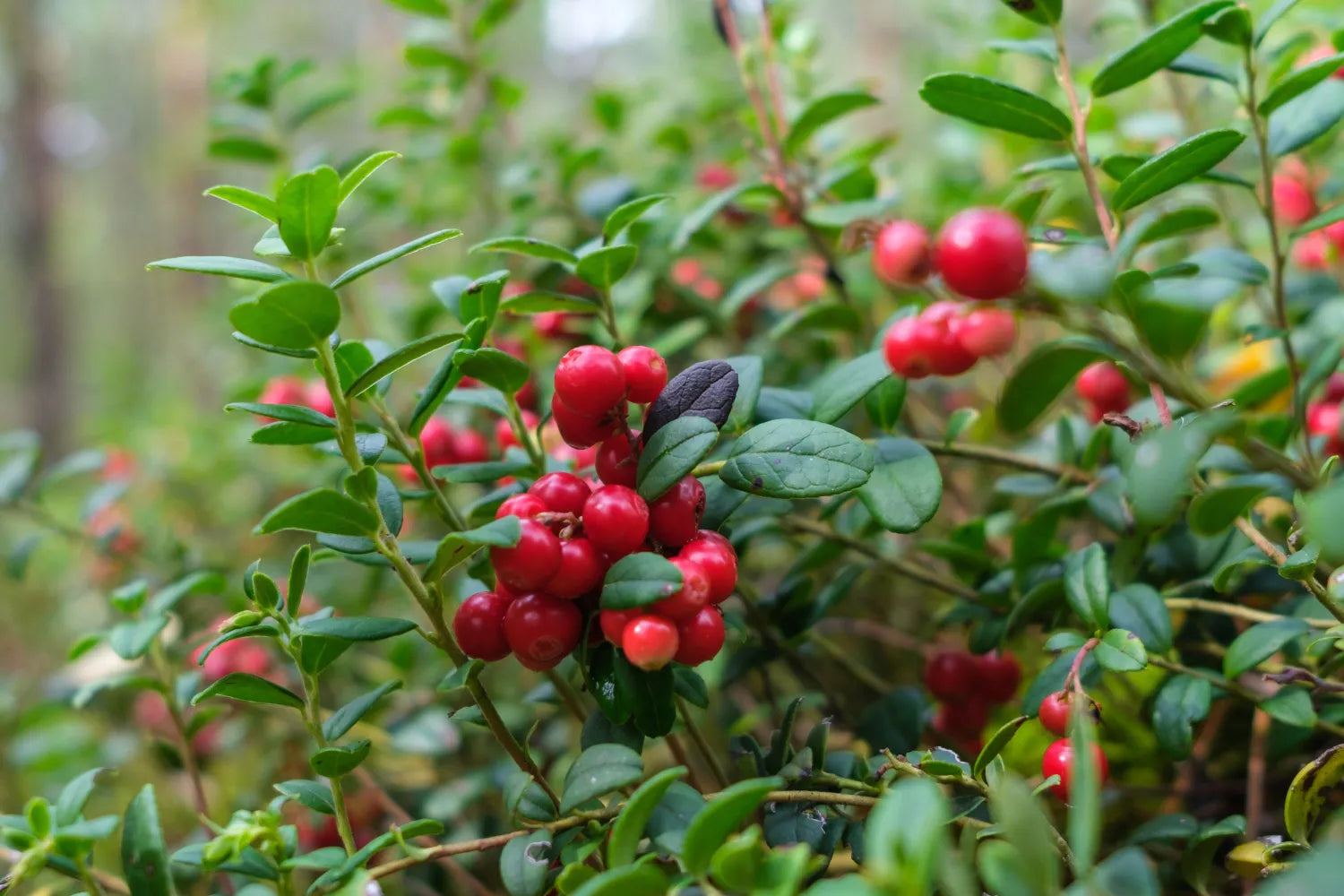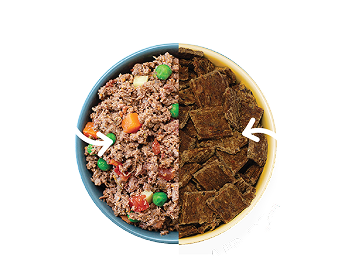
Can and Should Dogs Eat Cranberries or Other Berries?
Like many fruits, cranberries and other berries offer a bundle of benefits and a splash of color to any dish. But when it comes to sharing these tart little fruits with our dogs, there are a few things to consider.
At A Pup Above, we're diving into the details of feeding cranberries to dogs, exploring both the upsides and the precautions to keep your pup happy and healthy.
Are Cranberries Safe for Dogs To Eat?
Let's talk cranberries. These little red gems are more than just a side dish at dinner. They can be a great addition to your dog's diet when used correctly. Yes, dogs can eat cranberries, but like any good thing, it should be done in moderation.
Cranberries are naturally low in calories and high in vitamins, minerals, and antioxidants, which can contribute to overall health. However, because of their tartness and high acidity, it’s best to give them to your dog in small amounts to avoid any stomach upset.
Why Toss Some Cranberries Into Your Pup's Bowl?
Alright, so cranberries are on the guest list for your dog’s dinner, but what makes them a hit at the feast? Beyond their bright pop of color and tart zing, cranberries bring a basket of perks to the party.
Vitamin C Kick
Cranberries are bursting with Vitamin C, which is a real pick-me-up for your dog's immune system and keeps their skin and coat happy and healthy.
Smile Sparklers
These berries have a knack for helping to keep your pup’s mouth clean. They can deter bacteria in the mouth, which means fresher breath and cleaner teeth.
Comfort Food
Rich in nutrients that help support comfortable joints and muscles, cranberries can make playing fetch a little easier for your dog.
Urinary Tract Support
They’re famous for helping keep the urinary tract running smoothly, which is a big plus for dogs who tend to have urinary issues.
Are There Any Downsides to Cranberries for Dogs?
While cranberries are a super snack with some great benefits, it's also wise to look at the full picture before tossing these berries into your dog’s diet.
Just like any treat, cranberries come with a few considerations to keep in mind:
Tartness and Taste
Cranberries are famously tart, which might not tickle all taste buds equally. Some pups might turn up their noses at the sharp flavor, especially if they’re introduced to it suddenly.
Tummy Troubles
Due to their acidity, cranberries can sometimes lead to mild stomach upset, particularly if your dog gobbles down too many at once. It’s all about moderation to keep those tails wagging without any wags of discomfort.
Caloric Content
While they’re not high in calories, cranberries do add to the daily count, so it’s important to adjust treats accordingly to maintain a healthy weight.
Sugar in Dried Cranberries
If you’re thinking about dried cranberries, remember they often contain added sugars or other preservatives, which are not ideal for dogs. Stick to fresh or frozen cranberries to keep things clean and simple.
So, Should Dogs Eat Cranberries?
You've learned the benefits and uncovered the cons, and now you're wondering: should cranberries make the cut for your pup's menu? Absolutely, with some caution! Given their health perks, like supporting immune function and a clean mouth, cranberries can be a wonderful addition to your dog's diet.
However, it's important to introduce them gradually and in moderation. Fresh or frozen cranberries offer the best nutrients without the extra sugars found in dried varieties. Also, keep an eye on your dog's reaction to their new tart treats, as every pup's tummy and taste buds are different.
What Other Berries Can Dogs Safely Enjoy?
Curious about which other berries can join cranberries on the list of dog-safe snacks? Berries generally pack a punch of nutrients in a tiny package, and many are safe for dogs, offering a variety of flavors and health benefits.
Let's take a stroll through the berry patch and pick out some dog-friendly options that can add a splash of color and a burst of vitamins to your pup's diet.
Blueberries
Blueberries are a superfood not just for humans but for our canine friends, too. They're loaded with antioxidants, vitamins C and K, and fiber, which are great for your dog's overall health. Plus, their small size makes them perfect for a quick snack without the mess.Strawberries
Strawberries are another berry that dogs can enjoy. They're high in fiber and vitamin C, plus they have a little enzyme that can help whiten your dog's teeth as they munch. Just remember to cut them into small pieces to prevent choking and to moderate the natural sugars.
Raspberries
Raspberries offer a tasty treat with lower sugar than many other fruits, making them a great choice for older dogs or those watching their weight. They're also rich in manganese and vitamins C and K. However, they do contain small amounts of xylitol, so keep the portion size small.
Blackberries
Like their berry cousins, blackberries are safe for dogs and have a lot of the same nutritional benefits, including antioxidants, vitamins C and K, and fiber. They're a bit tart, which some dogs love, and can be a refreshing summer treat.
Tips for Berry Success in Your Dog's Diet
Ready to sprinkle some berry magic into your dog's meals? Berries are a fantastic way to add a burst of flavor and nutrients, but like any good chef, it's essential to follow a few tips to make sure every berry bite is a success.
Keep these pointers in mind as you introduce these fruity treats:
Start Small
When adding new items like berries to your dog’s diet, start with a small amount to see how they handle it. This helps ensure they don’t have any adverse reactions and lets their digestive system adjust.
Balance the Diet
Berries should be a treat, not a staple. Make sure they only make up a small portion of your dog's overall diet. This keeps their meals well-rounded and nutritionally complete.
Mix With Meals
Sprinkle some berries over their usual meals for a burst of flavor. Mixing berries with our sous-vide, human-grade dishes like Turkey Pawella or Porky’s Luau can turn an ordinary dinner into a festive and nutritious feast, ensuring your pup gets both enjoyment and health benefits in every bite.
Create Fun Treats
Think beyond just adding berries to their bowl. Whip up some homemade treats by blending berries into recipes for frozen treats or baked goodies. It’s a creative way to utilize the wholesome goodness of berries in a fun, rewarding way for your dog.
Conclusion
So, can dogs indulge in cranberries and other berries? Absolutely! With moderation and proper introduction, cranberries, along with blueberries, strawberries, and more, can add a vibrant touch of flavor and an array of nutrients to your dog's diet.
These little fruits are not just treats but powerful pals in supporting your pet's health, from enhancing immune function to providing antioxidants. At A Pup Above, we're all about integrating wholesome ingredients into our meals.
Our sous-vide, human-grade dishes are crafted with this philosophy in mind — providing balanced, nutrient-rich meals that cater to your dog's taste and health. Why not mix in some fresh berries for an extra boost? It's a delicious way to enrich your dog's diet with the natural goodness of berries.
Dive into our options and let your dog enjoy the wholesome and joyful experience of eating well!
Sources:
Can Dogs Eat Cranberries? | AKC
Cranberries and lower urinary tract infection prevention | PMC
Top Stories

Why Do Dogs Lick Their Paws?

Why Do Dogs Whimper & Make Noises in Their Sleep?

Healthy Vet-Approved Homemade Dog Food Recipes

How To Cook Sweet Potatoes for Dogs






















